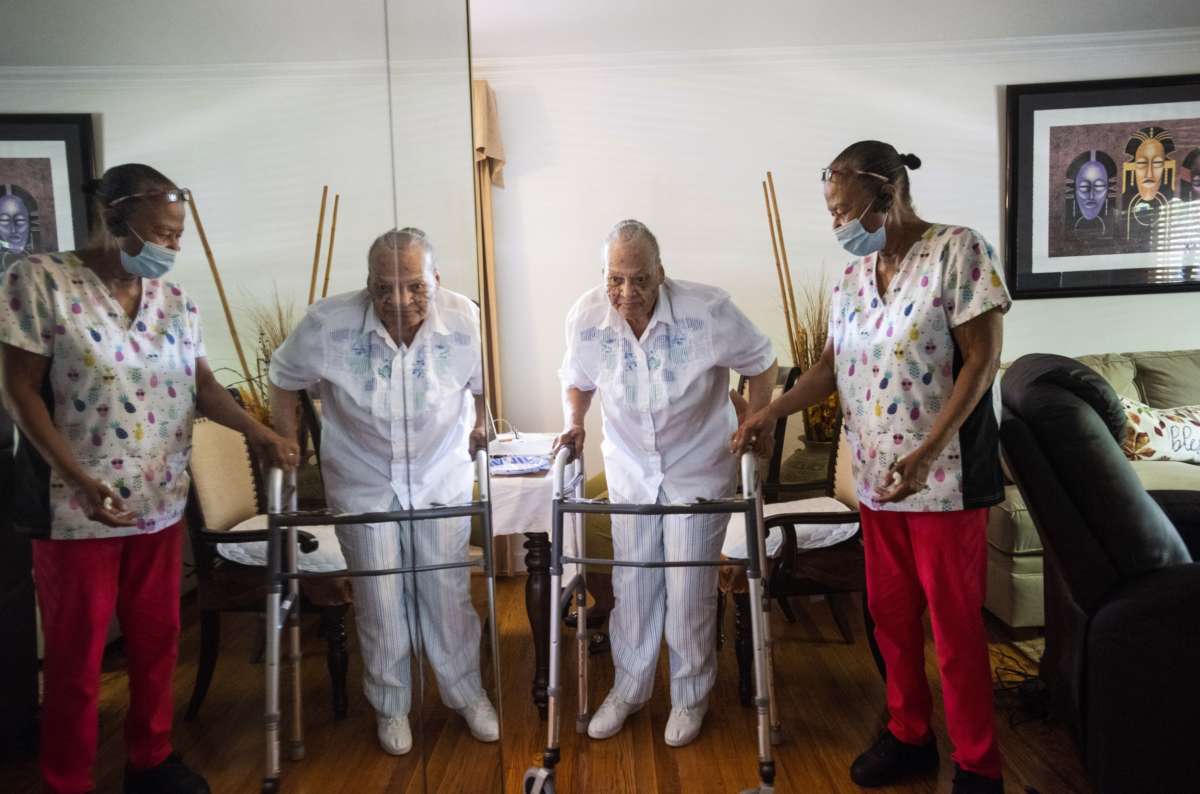Disability and labor advocates cheered when President Joe Biden’s Build Back Better agenda passed in the House of Representatives last week. The American Association of People with Disabilities praised the $150 billion investment in home care as “historic,” noting it is “the single biggest investment in the program’s history.” But privately, advocates are worried that the investment won’t solve problems like long waiting lists for home care and low wages for those who provide it.
The investment — less than half of what was originally promised, to be spent over 10 years — is unlikely to do much of what the Biden administration initially promised for home care, according to an internal memo circulated by advocates in July. During his presidential campaign, Biden pledged to clear waiting lists for home care and raise wages for workers. $150 billion, the memo said, may end up pitting workers, who are predominantly women of color, against disability advocates for access to limited funding. And because states also have to invest their own funds to get the federal matching amount, some may choose not to adopt the program at all.
The home care industry has suffered from underfunding and neglect for decades. There are years-long waiting lists for people with disabilities and seniors to receive necessary care. Workers are poorly compensated, averaging $12 an hour. The work is emotionally and physically intense. Workers are responsible for maintaining their clients’ health and assisting them in their basic needs, like eating or showering. Two-thirds of home care workers quit within a year, according to Home Care Pulse, a market research firm.
Some advocates worry that a fight over what gets funded — more capacity for those who need home care or better wages for those who provide it — will fracture a relatively new peace between labor unions and disability advocates. For years, labor unions were some of the staunchest opponents of closing asylums and segregated state schools for people with developmental disabilities. Some still are: The American Federation of State, County and Municipal Employees, the largest union of public employees in the United States, has described deinstitutionalization as “yet another way to push the responsibility for service and funding into the private sector.”
In contrast, disability groups unequivocally celebrate deinstitutionalization as a victory for human and civil rights. As unions including the Service Employees International Union have expanded their efforts to organize home care workers, national labor organizations have largely backed off fighting deinstitutionalization. But a fight over limited funding could damage this relatively new alliance. Ai-jen Poo, the executive director of the National Domestic Workers Alliance, warned of this potential outcome in the July memo. “A marked reduction in funding will not allow for the effective implementation of this policy, if states elect to participate at all, and will create grave tension within the broad-based coalition that supports this effort,” the memo reads.
Poo did not respond to a request for comment through communications staff.
The problem lies in the structure of Medicaid’s home care funding program, according to the memo. The federal government provides some funding, but states must opt in and contribute their own funding. Unlike the federal government, states cannot borrow money. If state legislatures need to cut costs, optional Medicaid programs are often first on the chopping block, according to an issue brief from the Kaiser Family Foundation. Multiple experts told The 19th that states with lower tax income per capita, such as Georgia or Alabama, are more likely to opt out of expensive optional programs.
Still, advocates for home care are relieved to have had their priorities included at all; a number of proposals didn’t make it into the version passed by the House. The prevailing sentiment among policy experts in D.C. was that some money is better than none.
This was shared by home care workers themselves. TunDe Hector, a certified nursing assistant from Georgia and member of SEIU, praised Biden’s Build Back Better agenda, even with the cuts.
“I think President Biden is doing a good job. He’s doing the best he can right now. Given the political climate, it’s very hard for him. This is his vision — of building back America and building it back better,” Hector told The 19th.
Hector stressed the importance of home care workers.
“Home care is the backbone. You need people who take care of people. We feed, bathe, brush teeth,” Hector said.
Josue Rodriguez, an Texas organizer for disability rights protest group ADAPT, praised the funding. Rodriguez has cerebral palsy and uses home care services himself. Last month, he attended a vigil in D.C. last month to push for home care funding.
“It’s a good starting point to relieve some of the issues that we’ve got,” Rodriguez said. “It’s not enough. But it’s a good starting point.”
Our most important fundraising appeal of the year
December is the most critical time of year for Truthout, because our nonprofit news is funded almost entirely by individual donations from readers like you. So before you navigate away, we ask that you take just a second to support Truthout with a tax-deductible donation.
This year is a little different. We are up against a far-reaching, wide-scale attack on press freedom coming from the Trump administration. 2025 was a year of frightening censorship, news industry corporate consolidation, and worsening financial conditions for progressive nonprofits across the board.
We can only resist Trump’s agenda by cultivating a strong base of support. The right-wing mediasphere is funded comfortably by billionaire owners and venture capitalist philanthropists. At Truthout, we have you.
We’ve set an ambitious target for our year-end campaign — a goal of $250,000 to keep up our fight against authoritarianism in 2026. Please take a meaningful action in this fight: make a one-time or monthly donation to Truthout before December 31. If you have the means, please dig deep.
